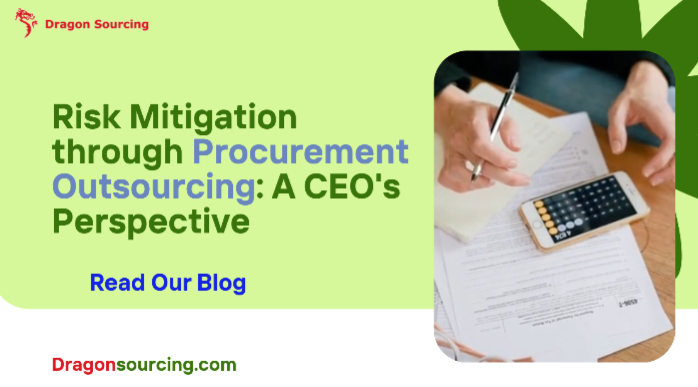
Summary:
Procurement outsourcing helps CEOs reduce operational risks and improve resilience.
It shifts focus from cost-cutting to strategic value creation and risk management.
External partners provide access to vetted suppliers and global sourcing networks.
It ensures compliance, reduces supply chain disruptions, and supports ESG goals.
CEOs gain better visibility, agility, and scalability in procurement operations.
Dragon Sourcing empowers businesses with customized, risk-conscious procurement strategies.
Outsourcing transforms procurement into a growth enabler, not just a support function.
Procurement in a Volatile World
The world is witnessing political turmoil, geopolitical crisis and economic disruptions in various places. During such times it becomes imperative to have a supply chain which is strong and effective. The problem arises when the age of traditional systems in which supply chains used to operate may not be enough in today’s world therefore for a CEO of a company it is imperative to ensure that the strategies which is the used in supply chain management of a company is strategic and also act as a shield against any kind of disruptions. The CEO of a company should make sure that the procurement goals are in tandem with the goals of profitability of a company.
Understanding Risk in the Procurement Landscape
There are a number of risks which the procurement of a company can faces on a day-to-day basis. The risk in procurement can be political, social, economic or related to geology. The geopolitical unrest refers to wars, insurgency or any area that is hit by a malfunctioning government. Economic disasters can refer to fluctuations of currency, inflation or depression. Now, these are the problems which may lead to disruptions in the supply chain because it might lead to an increase in cost or delay in transportation or an overall breakdown of the working conditions. These issues can only be dealt with proper planning and strategy.
The Strategic Role of Procurement Outsourcing
This is a very important part of the supply chain management because a good procurement outsourcing company is required to get a grip on the market and also lay hands on the best products and services required by the company from the market. Good sourcing techniques are helpful in minimization of surplus cost and maximizing the efficiency of the day-to-day procedures of a supply chain. A good strategy in procurement sourcing is also required to maintain good relationships with the suppliers in the market. Good strategies in procurement also takes into account the laws that are prevalent in the market and helps to comply and abide by them resulting in growth.
Key Risk Areas Addressed by Outsourcing Partners
Using Outsourcing can help the company to lay their hands on latest technology and also special skills which are used to procure the best products and services from the market. Outsourcing brings with it special skills which helps the company to run efficiently and also minimise the surplus cost when it comes to supply chain management. ESG, spend analysis and supplier management are a few areas in which outsourcing shines the most and benefits the company by making it capable of achieving its goals and sustainable profit. Outsourcing can also help a company to grasp the current trends that are popular in a market at a given moment of time. These kinds of insights help the company stay ahead of their competitors resulting in greater profits.
Case Example: How One CEO Reduced Exposure through Outsourcing
In the year 2012, the CEO of a company decided to outsource few IT services and other things to reduce the burden of surplus cost so that the effectiveness of the procedures that are carried out on a daily basis. Therefore, by shifting some of the production by collaborating with external partners help the company to reduce the surplus costs which were a burden on the budget of the company. Collaboration with external partners helped the company to stand up on its feet again along with minimising disruptions in the supply chain and procuring goods and services without any external disturbance.
Questions Every CEO Should Ask Before Outsourcing
The CEO of a company should keep in mind that before outsourcing to a company it is necessary to select a good partner because without reliability and trust a business cannot operate. The chief executive officer should also keep in mind that such collaborations must result in lower surplus cost and higher efficiency. The supplier selected for a particular task must comply with all the rules and regulations that are prevalent in the market. It is also required of the suppliers that follow all the ethical codes of the environmental laws that are in place. Apart from these things there are also other issues such as the timing required and the track record which should be studied when it comes to selecting an appropriate supplier.
Metrics That Matter
How to Measure Risk Reduction ROI
To make sure that the risks involved in supply chain management of a company are minimal, the CEO must ensure that the suppliers selected for a particular company are reliable and consistent in their work. To measure risk reduction, it is important to note the time taken by suppliers for delivery, the rate of defect and the consistency in which day to their job. All these pointers indicate whether the supplier is appropriate for the job or not. A systematic tracking and tracing of the supplier work processes is essential for smooth running of a company supply chain management.
Future Outlook: The CEO’s Evolving Role in Procurement Risk Management
The role played by a CEO is essential within the framework of procurement risk management. This is because it is the CEO that makes sure that the correct decisions are made and the right strategies are in place to take the company to greater glory and fulfill all major targets of sustained growth and profits. It is the CEO that ensures that the procurement is governed and handled with a tight grip so that there are minimal to no disruptions at all because any disruption might bleed the company financially. This is why a CEO ensures that a good relationship with the supplier is maintained and the reputation of the company in the market is spotless which is required for goodwill of the consumer base. This is only possible when the chief executive officer of a company ensures that all the requirements of the procurement management are fulfilled.
Conclusion
Turning Procurement into a Resilience Engine
The right procurement can be considered the building block of a company because it is through appropriate procurement procedures that the company establishes itself in the market. It also helps to satisfy consumer expectations and maintain goodwill in the market among various suppliers. The right procurement strategies can reduce cost, waste and time consumption thereby leading to greater profits.
Frequently Asked Questions (FAQ)
1. What is procurement outsourcing?
Procurement outsourcing is the practice of delegating specific procurement functions—such as sourcing, vendor management, and negotiation—to a third-party specialist to increase efficiency, reduce cost, and manage risk.
2. How does procurement outsourcing help mitigate business risks?
It provides access to expert risk assessment, robust supplier vetting, regulatory compliance, and diversified sourcing strategies that shield businesses from supply disruptions, quality issues, and market volatility.
3. Why should CEOs consider procurement outsourcing as a strategic move?
CEOs benefit from improved agility, reduced operational complexity, enhanced cost visibility, and better alignment between procurement goals and business strategy, enabling smarter and faster decision-making.
4. Can procurement outsourcing help during global supply chain disruptions?
Yes. Outsourcing partners often have broader supplier networks and risk-contingency strategies, allowing businesses to pivot quickly and maintain continuity during disruptions such as pandemics or geopolitical events.
5. How does Dragon Sourcing ensure compliance and supplier reliability?
Dragon Sourcing uses a rigorous supplier qualification process, conducts regular audits, and enforces ethical sourcing and sustainability practices to ensure ongoing compliance and performance.
6. What procurement functions can be outsourced?
Typical functions include supplier identification, market research, tendering, negotiation, contract management, and logistics coordination.
7. Is procurement outsourcing only beneficial for large enterprises?
No. SMEs can also leverage procurement outsourcing to access global supplier markets, optimize costs, and reduce operational risks without building a large internal team.
8. How is cost savings achieved through procurement outsourcing?
By leveraging economies of scale, supplier competition, expert negotiation, and local sourcing intelligence, outsourcing partners can significantly reduce procurement spend.
Author’s Bio:
Pankaj Tuteja
Head of Operations – India
https://www.dragonsourcing.com




